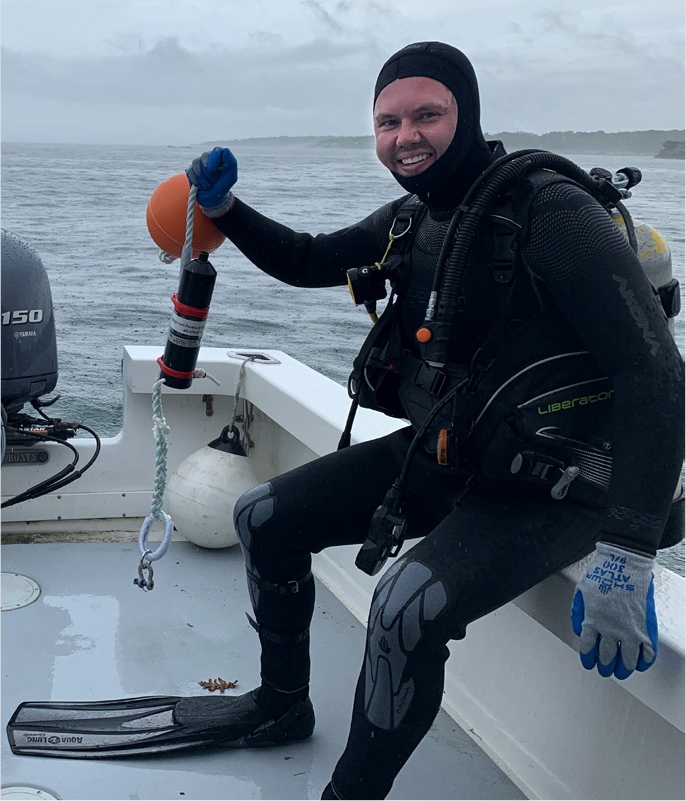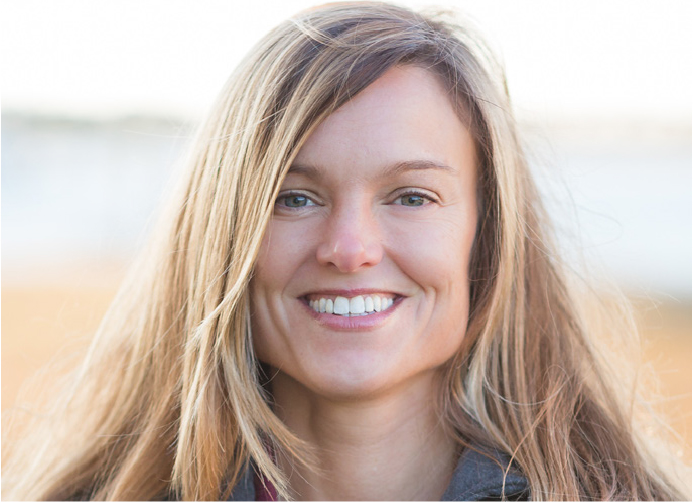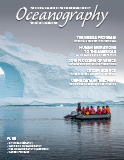Full Text
 |
CONOR McMANUS | Deputy Chief, Rhode Island Department of Environmental Management, Division of Marine Fisheries
Degree: When, where, what, and what in?
I received my BA from Boston University in 2010 with a major in marine science. After graduating, I began my MS in oceanography at the University of Rhode Island’s Graduate School of Oceanography (GSO), examining oceanographic and wastewater management influences on primary production rates in Massachusetts Bay. Once graduated in 2012, I then left academia for two years, but returned in 2014 to pursue a PhD in oceanography at GSO and completed it in 2017. My dissertation focused on modeling Northwest Atlantic mackerel abundance and habitat suitability trends using various modeling techniques.
Did you stay in academia at all, and if so, for how long?
Since earning my PhD in 2017, I have been involved in academia through giving guest lectures and serving on graduate student committees across various southern New England universities. I serve as an adjunct professor for GSO and have received several grants as a coprincipal investigator on projects that support graduate research assistantships.
How did you go about searching for a job outside of the university setting?
My first job after completing my master’s degree was with a local oceanographic consulting firm, RPS (formerly Applied Science Associates). My work entailed assessing marine biota injuries from the Deepwater Horizon oil spill as a subcontractor to NOAA. I was first introduced to the firm via a graduate school colleague who knew my background. When he heard I was looking for employment, he suggested I come and visit with the company’s managers to see how my background might fit with their group. As luck would have it, they were beginning a search for a fisheries scientist, and I joined the group immediately after defending my master’s thesis. My job searches since then have been similar; often, I have been notified by colleagues that certain groups or agencies were looking to hire or have had job postings forwarded to me from friends or listservs for memberships and societies to which I belong.
Is this the only job (post-academia) that you’ve had? If not, what else did you do?
When I was a part-time PhD student, I continued to work for RPS and then for the Rhode Island Department of Environmental Management’s (RIDEM) Division of Marine Fisheries. For RIDEM, I began as a principal marine biologist working on the science and management of several marine species, including American lobster, winter flounder, northern quahog, and Jonah crab. This entailed participating in various long-term resource monitoring projects known as fisheries-independent surveys, performing and advising on research projects, and providing statistical analyses to inform the trade-offs between various fisheries management measures. Before joining RIDEM, I also briefly worked as a contractor for NOAA’s Northeast Fisheries Science Center, where I synthesized life history information for fish and invertebrate species of the northeast US continental shelf to assess stocks’ vulnerability to climate change.
What is your current job? What path did you take to get there?
I currently serve as the Deputy Chief for RIDEM Division of Marine Fisheries. I oversee the research and assessment components of our office as they relate to marine fish, invertebrates, and their habitats. This work covers a suite of species—from shellfish to sharks—that inhabit New England waters. My staff and I use field monitoring, laboratory studies, and analytical tools to address questions endemic to the various species and to fisheries. As part of my job, I sit on a wide range of local and national committees and boards regarding marine fisheries science and sustainable management. The path to my current job may be rare in that I was pursuing my degree part time while working full time.
What did your oceanographic education (or academic career) give you that is useful in your current job?
The principles of oceanography have been immensely helpful for my career and in informing my work in fisheries oceanography. With continued focus on how climate change impacts our ocean and its resources, the oceanography disciplines have become paramount in improving my ability to conduct appropriate science to inform proper fisheries management. Programing and statistical skills I gained through my graduate coursework and research are perhaps the most marketable skillsets acquired through my education. Through GSO, graduate research advisers, and collaborators, I was able to network with scientists across the globe. I learned so much from all these different networks, and association with them extended the relevancy of my work to distant regions.
Is there any course or other training you would have liked to have had as part of your graduate education to meet the demands of the job market?
I have found that programming and statistical skills are highly valuable across so many jobs, and opportunities to build these strengths will almost certainly help any student looking for a job. There are other statistics and computing language courses that I would have liked to take, such as Python or Bayesian statistics. As a graduate student, I wish I had gone on more research cruises. The experience of independently conducting one’s own project at sea over a long duration and in adverse conditions provides an uncommon skillset that can be valuable, depending on the job.
Is the job satisfying? What aspects of the job do you like best/least?
For someone interested in applied field and analytical work, the job is incredibly satisfying. I always desired a career that would allow me to be on and under the water conducting science. To be able to do that for my career is in many ways a dream come true. I also feel extremely lucky to be involved in cutting-edge science and research, which has kept me involved in academia through many avenues (and which I truly love!). The RIDEM Division of Marine Fisheries plays a significant role in sustainably managing marine resources, so all the work that our division does has an applied nature, with both science and management activities relevant to stakeholders and society along the US East Coast. As Deputy Chief, perhaps the most rewarding aspects of my job are working with and advising staff on their research and projects and seeing them succeed.
Do you have any recommendations for new grads looking for jobs?
One thing I have really benefited from was gaining experience from opportunities that unexpectedly presented themselves. I would advise students to take any opportunities that allow you to try something new and expand your background or expertise. You never know what experience from your past will lend itself to the next job opportunity. Also, I recommend applying for any job openings that seem appealing, despite any preconceived notions about whether you think you’d be hired. Timing is everything, and you never know what the applicant pool will be for the position. By applying, at a minimum, you have a chance. Lastly, it always helps to know what your dream job is or what you want to do. If that job exists, try to learn from those currently in that profession and determine what skills or degrees you need for the position. If the job doesn’t exist, don’t be afraid to be a trailblazer and make it one!
 |
NICOLE ELKO | President, Elko Coastal Consulting Inc.
Degree: When, where, what, and what in?
I began as a forestry major in 1993 at Penn State, but two important events changed my course. During my sophomore year, I participated in an Outward Bound excursion that consisted of sailing in the Florida Keys, and the following summer I took a cross-country camping and backpacking trip with a friend. I’ll never forget seeing the Pacific Ocean for the first time at Big Sur. That’s where I had an epiphany: I wanted to study coastal processes. I went back to Pennsylvania to try to figure out how to do that. In 1996, I earned a bachelor of science degree in environmental resource management with a minor in marine science. This laid the foundation for my future career in coastal management.
I then moved to the coast to attend graduate school at the University of South Florida (USF), a much more convenient location for fieldwork. I earned an MS in geology in 1999 and immediately began a PhD program, but then made some big career moves while working toward graduation in 2006.
Did you stay in academia at all, and if so, for how long?
I did not stay in academia. In fact, I left before I graduated. Although I eventually received my PhD from the USF Geology Department where I started, I transferred to the School of Marine Science for a while, and for two years I worked at the US Geological Survey Center for Coastal Studies in St. Petersburg, Florida. I was then offered a position as the Pinellas County Coastal Coordinator, which sent me into the public sector. I never went back.
How did you go about searching for a job outside of the university setting?
I was fortunate to be living, studying, and working in the coastal and marine science mecca of the Tampa-St. Petersburg area. There were ample opportunities to work in the career field that I’d chosen. The first person I always started with when looking for a new direction was my advisor. I received excellent advice from advisors at Penn State and at USF regarding future directions, contacts, and work opportunities.
Is this the only job (post-academia) that you’ve had? If not, what else did you do?
I’ve been running my own consulting business since leaving Florida in 2009. This is my third “real” job.
What is your current job? What path did you take to get there?
I am President of Elko Coastal Consulting, which specializes in beach preservation advocacy, research, and management. In this position, I play several roles. I provide coastal management services to beach communities, and I also provide advocacy services to nonprofit organizations. For example, one of my roles is Science Director of the American Shore and Beach Preservation Association (ASBPA). There, I aim to help translate societally relevant coastal management challenges into research needs and science questions for the nearshore research community to address.
I am now based in a region strong in coastal management, at Folly Beach, South Carolina, just outside of Charleston, near NOAA’s Office for Coastal Management and the South Carolina Department of Health and Environmental Control Ocean and Coastal Resource Management. Deciding to go into business on my own was scary, and I did a few jobs for pennies to get a foot in the door in South Carolina. But it paid off, and now another of my roles is executive director of the South Carolina Beach Advocates, a nonprofit that I helped to found in 2015.
What did your oceanographic education (or academic career) give you that is useful in your current job?
I still use many of my graduate school textbooks when writing papers and reports. The technical training that I received from Skip Davis and Bob Dean is still relevant in my coastal management and advocacy work. They taught me more than textbook materials as well. The skills of observation and deduction that I learned as a field geologist and an aspirational coastal engineer have made me not only a keen scientist but also a better service provider to my clients.
Is there any course or other training you would have liked to have had as part of your graduate education to meet the demands of the job market?
My last answer alluded to the social aspect of coastal management. Training in the social sciences and business management would be useful in most careers.
Is the job satisfying? What aspects of the job do you like best/least?
Yes, I love making connections between coastal management challenges at the local and national levels. Coastal managers around the United States all face similar challenges, but it is useful to remind them that there are others out there, maybe on the other coast, in the same boat, so to speak.
Do you have any recommendations for new grads looking for jobs?
Pick your specialty based on your passion and start networking early. A solid network of colleagues and coworkers is your most valuable asset in career development.

